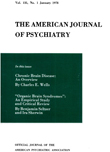A COMPARATIVE STUDY AND EVALUATION OF ELECTRIC SHOCK THERAPY IN DEPRESSIVE STATES
Abstract
A group of 70 patients with various forms of depression have been reviewed for immediate as well as late therapeutic achievements with electric convulsive shock treatment, the efficiency of which was considered with reference to several standard criteria, chiefly derived from experiences in a clinically comparable group of 68 control patients. This study led to the following observations on the value of electric shock therapy:
[SEE TABLE IN SOURCE PDF]
1. The improvement rate was 30% and the recovery rate 44% higher with than without shock therapy, whereas the increase rate of relapses or failures during the first year after discharge was almost twice as high in the controls as in the treated group of patients.
2. Marked improvement or full recovery is at times accomplished in chronic depressions of completely disabling degree, where inherent trends toward remission are apparently lacking.
3. Spontaneous remissions are markedly enhanced in degree and quality of improvement.
4. The length of a depressive episode and the need for hospitalization are reduced by 75% to 90% of the computed average duration in untreated attacks.
5. A maximal therapeutic gain of 52% was achieved in involutional melancholias. This gain is especially impressive if one takes into consideration that this form of depression has the least favorable prognosis among the various diagnostic types and without shock therapy.
6. The commonly discussed prognostic indicators regarding the outcome of shock therapy appeared too inconsistent in their implications and insufficiently explored in detail to be adequate for practical clinical considerations.
7. Manifest untoward effects of electric shock therapy are relatively insignificant as compared to the therapeutic gains.
Access content
To read the fulltext, please use one of the options below to sign in or purchase access.- Personal login
- Institutional Login
- Sign in via OpenAthens
- Register for access
-
Please login/register if you wish to pair your device and check access availability.
Not a subscriber?
PsychiatryOnline subscription options offer access to the DSM-5 library, books, journals, CME, and patient resources. This all-in-one virtual library provides psychiatrists and mental health professionals with key resources for diagnosis, treatment, research, and professional development.
Need more help? PsychiatryOnline Customer Service may be reached by emailing [email protected] or by calling 800-368-5777 (in the U.S.) or 703-907-7322 (outside the U.S.).



